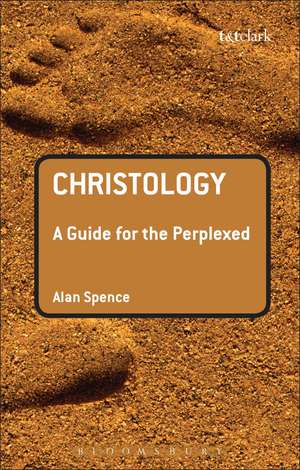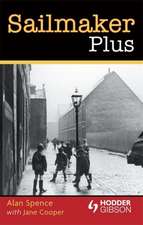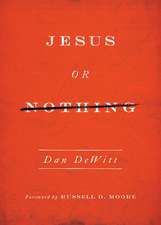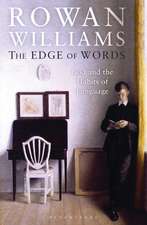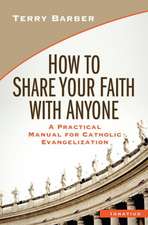Christology: A Guide for the Perplexed
Autor Rev Dr Alan J. Spenceen Limba Engleză Paperback – 14 noi 2008
| Toate formatele și edițiile | Preț | Express |
|---|---|---|
| Paperback (1) | 169.16 lei 6-8 săpt. | |
| Bloomsbury Publishing – 14 noi 2008 | 169.16 lei 6-8 săpt. | |
| Hardback (1) | 771.10 lei 6-8 săpt. | |
| Bloomsbury Publishing – 14 noi 2008 | 771.10 lei 6-8 săpt. |
Preț: 169.16 lei
Preț vechi: 197.79 lei
-14% Nou
Puncte Express: 254
Preț estimativ în valută:
32.38€ • 33.67$ • 27.13£
32.38€ • 33.67$ • 27.13£
Carte tipărită la comandă
Livrare economică 14-28 martie
Preluare comenzi: 021 569.72.76
Specificații
ISBN-13: 9780567031952
ISBN-10: 0567031950
Pagini: 192
Ilustrații: black & white illustrations
Dimensiuni: 138 x 216 x 13 mm
Greutate: 0.18 kg
Editura: Bloomsbury Publishing
Colecția T&T Clark
Locul publicării:London, United Kingdom
ISBN-10: 0567031950
Pagini: 192
Ilustrații: black & white illustrations
Dimensiuni: 138 x 216 x 13 mm
Greutate: 0.18 kg
Editura: Bloomsbury Publishing
Colecția T&T Clark
Locul publicării:London, United Kingdom
Caracteristici
Christology is studied on all undergraduate courses either as a separate module or as part of New Testament or Systematic Theology
Cuprins
INTRODUCTION CLASSICAL CHRISTOLOGY THE PARADOX INCARNATION ATHANASIUS AND THE ARIANS THE HUMAN MIND OF THE WORD OF GOD DIVINE AND HUMAN WILLING IN CHRIST JESUS AND THE SPIRIT MODERN CHRISTOLOGY THE SOCINIAN CHALLENGE TO NICEA IN SEARCH OF THE HISTORICAL JESUS A THEOLOGY OF RELIGIOUS EXPERIENCE THE CHRIST OF FAITH AND THE JESUS OF HISTORY THE DOCTRINE OF THE WORD OF GOD RESURRECTION AS REVELATION CONCLUSION AN ECUMENICAL CHRISTOLOGY
Recenzii
The excellent seris of introductions entitled A Guide for the Perplexed has a worthy addition in Alan Spence's Christology.
Clearly written and made more accessible for the general reader by its brief chapters and halpul headings. [...] the book is useful and well argued.
[Alan Spence] offers a lucid historical and conceptual introduction to classical and modern Christology... This historical background provides an essential foundation on which to outline later developments and discuss contemporary approaches to the subject.
Spence's book serves as an excellent introductory summary that helpfully clarifies the complex and contentious issue of Christology.
Christology is a useful book as we continue to refute error and pursue a biblical understanding of Christ amid the swirl of theological 'innovation'.
In this book, Alan Spence introduces the reader to the trajectories of both classical and modern Christology, with an equal part devoted to both. He presents his role as that of a host who is required to introduce a late arrival (the reader) to two groups of distinguished guests (church fathers and modern theologians) at a dinner party. His role is to connect the newcomer to the conversation that has been going on between the two groups. Spence is a good guide to both groups, although he seems on surer footing in describing classical Christology. In reality, though, Spence is more than a host, for he has his contribution to make.
The first part of the book offers a concise summary of the most important concepts involved in Christology.
This admirably lucid book fills an extremely important gap in the theological market, offering a historical and conceptual introduction to classical and modern Christology. While allowing it to speak for itself, Spence weaves the material into a sensitive meta-narrative, thus offering a coherent and digestible account of the development of Christology. In doing so he brings conceptual clarity to the conundrums encountered along the way, and above all highlights what exactly was at stake at each stage.
Mention -Book News, February 2009
Title mentioned in author's article in Reform, November 2009
Clearly written and made more accessible for the general reader by its brief chapters and halpul headings. [...] the book is useful and well argued.
[Alan Spence] offers a lucid historical and conceptual introduction to classical and modern Christology... This historical background provides an essential foundation on which to outline later developments and discuss contemporary approaches to the subject.
Spence's book serves as an excellent introductory summary that helpfully clarifies the complex and contentious issue of Christology.
Christology is a useful book as we continue to refute error and pursue a biblical understanding of Christ amid the swirl of theological 'innovation'.
In this book, Alan Spence introduces the reader to the trajectories of both classical and modern Christology, with an equal part devoted to both. He presents his role as that of a host who is required to introduce a late arrival (the reader) to two groups of distinguished guests (church fathers and modern theologians) at a dinner party. His role is to connect the newcomer to the conversation that has been going on between the two groups. Spence is a good guide to both groups, although he seems on surer footing in describing classical Christology. In reality, though, Spence is more than a host, for he has his contribution to make.
The first part of the book offers a concise summary of the most important concepts involved in Christology.
This admirably lucid book fills an extremely important gap in the theological market, offering a historical and conceptual introduction to classical and modern Christology. While allowing it to speak for itself, Spence weaves the material into a sensitive meta-narrative, thus offering a coherent and digestible account of the development of Christology. In doing so he brings conceptual clarity to the conundrums encountered along the way, and above all highlights what exactly was at stake at each stage.
Mention -Book News, February 2009
Title mentioned in author's article in Reform, November 2009
